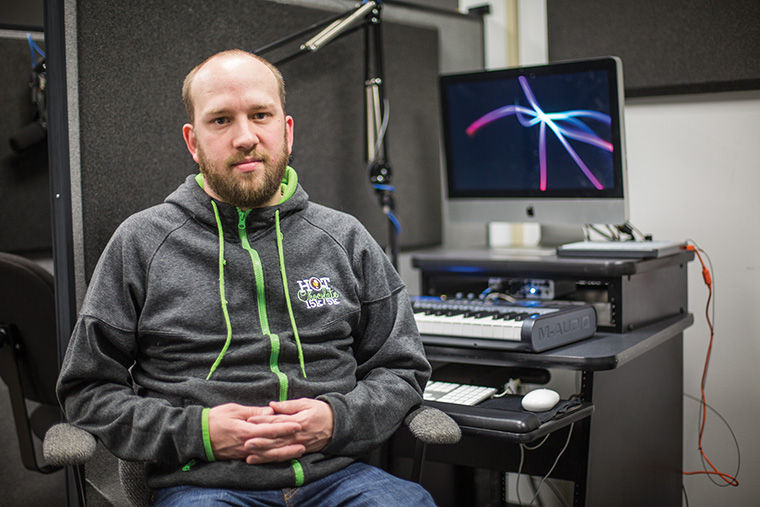Staff fights for on-campus visibility
Nick Hoeppner, president of the United Staff of Columbia College and an engineer in the Radio Department, said he is bargaining with the administration for a better staff contract because some staff members feel undervalued by the campus community.
April 13, 2015
One group on campus wants to make its presence better known as the Columbia community continues to react to the recently unveiled Strategic Plan.
Posters created and distributed by college staff members that outline the ways staff members impact student success are appearing across campus. Sheila Brady, licensure officer in the Education Department, said the posters, which began being distributed on March 31, were inspired by conversations she had with members of the United Staff of Columbia College, the college’s staff union.
Brady said she has seen staff members remain undervalued by the college during her 22 years of service to the college, and said she wanted to take action by voicing her own and other staff members’ opinions on the subject.
“Oftentimes staff are like an afterthought,” Brady said. “We would like to make it evident to all of the college—the administration, the faculty and students—the role that staff does play in the life of the college and in student success. It’s something that should not only be made evident, but be celebrated within the Columbia community.”
Brady said she invited staff members to submit phrases detailing what kinds of duties they performed at the college, which were then added to the posters.
“We found that a lot of staff members directly help students get to success,” Brady said. “Faculty are here for a class and are here for office hours, but then they are not here. Staff is always here.”
Nick Hoeppner, president of US of CC and an engineer in the Radio Department, said although the poster campaign was launched during the feedback phase of the Strategic Plan, it is not solely in response to the plan, and it is a bigger statement focusing on issues the college’s staff has faced for years.
While some staff members do feel appreciated within their departments, Hoeppner said other staff members have informed him that they have felt undervalued by upper-level administrators.
“People don’t feel like they are appreciated by the upper administration,” Hoeppner said. “Our membership is telling us that they want to get paid more. Along with that, staff wants respect and understanding of what staff provide to the college as a whole.”
Although faculty often hold the most significant role in directly educating students, Hoeppner said staff also contribute to students’ education because they interact with them on a daily basis through student organizations and on-campus jobs.
In the Radio Department, Hoeppner said he serves as one of the primary individuals students go to if they need help in a classroom or a studio. He said he provides technical assistance to students, which consequently furthers their education in certain ways.
“Our staff work in academic departments, so they are integral to the teaching process,” Hoeppner said. “A lot of our [staff] members feel that in the higher administrative levels of the college, they don’t actually understand what the role of staff is on campus.”
Michael Joseph, a junior theatre major and a production work aide in the Theatre Department, said his supervisors have had a significant role in his education at the college. He said he regularly works with five to 10 different staff members at his on-campus job.
Because staff members often do not teach courses, they put all of their effort into the other branches of the department, which ultimately makes it function better, Joseph said.
“We need someone whose job it is to focus on what the students need and focus on the actual department without having to worry about doing that and also teaching about 20 kids for three different classes,” Joseph said. “It’s too hard on one person.”
Joseph said he does not think the college should cut staff positions in the future because the college and its departments would suffer as a result.
“We don’t really pay attention to staff members as [much as] we should, and they are like the background people,” Joseph said. “You need faculty members to teach those students, but you also need staff members to help put the pieces together. Without staff, Columbia College is going to fall apart sooner or later.”








